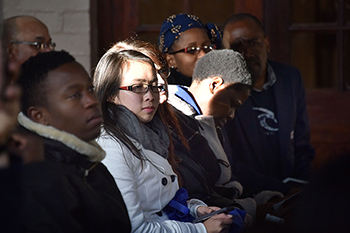Latest News Archive
Please select Category, Year, and then Month to display items
12 January 2024
|
Story Nonsindiswe Qwabe
|
Photo Sonia Small
 Since joining the UFS in 2008, Dr Grey Magaiza has worked extensively on approaches that can foster the socio-economic transformation of societies.
Since joining the UFS in 2008, Dr Grey Magaiza has worked extensively on approaches that can foster the socio-economic transformation of societies.
“The future should be one where communities can decide on their development agenda and futures. That’s the most important for me.” Dr Grey Magaiza, Deputy Director of the Centre for Gender and Africa Studies (CGAS) and Head of the Community Development programme on the Qwaqwa Campus, is passionate about capacitating communities to be agents of change and advancement. His vision for the future emphasises the empowerment of communities to take charge of their development by actively participating in decision making and the implementation of development projects that can improve their lives.
Since joining the UFS in 2008, Dr Magaiza has worked extensively on approaches that can foster the socio-economic transformation of societies. Over the years, he has crafted his research speciality into one that he is most proud of – being an interdisciplinary scientist immersed in the development of communities.
“I’m in a fortunate position of researching what I like. I say ‘fortunate’, because I’ve taken the time to understand what I’m passionate about, which is the overall field of rural livelihoods and livelihood futures – in short, community development. My research starts from an engaged university, understanding the elements that a university must use to enhance transformation and relevance to its immediate community in terms of development.”
One of the ways he has done this is by looking at social entrepreneurship as a development approach for young people in a rural setting. Through workshops with non-profit and civic organisations in Qwaqwa, Dr Magaiza has been helping these organisations to map out their needs and actively meet them through the involvement and support of external role players.
“We understand that communities are part of the national development agenda, but even that national agenda respects community knowledge and intentions and allows communities to shape their identity. A critical enabler of this is community organising. You bring back the capacity in communities to have dialogues on issues affecting them as spaces for engagement, knowledge exchange, and for people to just talk about their way forward.”
By enabling communities to define their development agenda, they can address their specific needs, challenges, and aspirations, he said. “When I look at livelihood futures, it’s quite an exciting aspect of my work – it’s like looking into a fortune tellers’ globe, because you’re not deciding for communities what they should do, but the communities themselves take those decisions.”
Postgraduate Open Day: Mapping the journey
2016-06-27

Prospective postgraduate students listen
attentively at the Postgraduate Open Day
Photo: Charl Devenish
“Whether you are a psychologist, a theologian, an economist, a political scientist, a chemist, or a physician, the purpose of knowledge is to improve the lives of others.”
Prof Jonathan Jansen, Vice-Chancellor and Rector of the University of the Free State (UFS), was speaking at the opening of the Postgraduate Open Day, held on our Bloemfontein Campus on 22 June 2016. In addition, he highlighted these grounds for considering postgraduate studies:
• To be globally literate and globally mobile
• To gain the satisfaction of understanding the world more deeply
• To serve as an inspiration to others to further their studies
Prof Fanie Snyman, Dean of the Faculty of Theology, said, “One of the benefits of postgraduate studies especially is that they enable you to think critically. This capacity helps you to understand society better—even outside your field of expertise.”
Prospective postgraduate students were assisted in selecting a suitable postgraduate degree, as a first step in mapping out their postgraduate journey at the UFS.
Kgosi Makhetha, who is currently studying a degree in Business Administration, agreed with Prof Jansen, saying, “Studying gives me great satisfaction. I truly believe that postgraduate studies will give me an edge in the current labour market.” Kgosi plans to enrol for an Honours degree in Industrial Psychology in the Faculty of Economic and Management Sciences.
Prof Jansen concluded by exhorting students to “study to make a difference.”